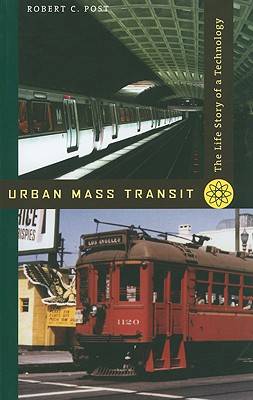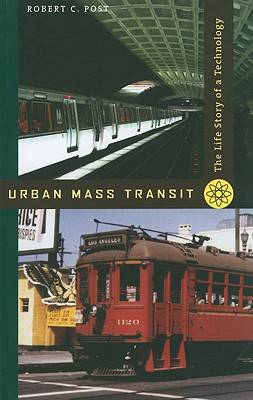
- Afhalen na 1 uur in een winkel met voorraad
- Gratis thuislevering in België vanaf € 30
- Ruim aanbod met 7 miljoen producten
- Afhalen na 1 uur in een winkel met voorraad
- Gratis thuislevering in België vanaf € 30
- Ruim aanbod met 7 miljoen producten
Omschrijving
Technological choices depend on, and are part of, contests over political power, as the history of mass transit vividly illustrates. From horse-drawn omnibuses to subways to light rail, this volume highlights the technological and social struggles that have accompanied urbanization and the need for an efficient and cost-effective means of transportation in cities.
Post depicts mass transit as a technology--rather, as a technological system--that provided an essential complement to industrialization, urbanization, and, ultimately, to the rise of consumer culture. He begins his narrative with the omnibus and horsecar in the 1830s and takes it to the renaissance of urban mass transit at the turn of the 21st century. Post focuses on innovations in the United States as well as worldwide developments.
At the heart of the story is the streetcar, a conveyance that played a central role in the development of all U.S. cities and towns. For generations of Americans, streetcars were essential to everyday life. Once dominating the urban landscape in towns and cities throughout the United States, the streetcar has all but disappeared. Post traces its evolution and demise, debunking the urban myth that the downfall of the electric streetcar was directly attributable to the corporate malfeasance of General Motors and others from the automotive world.
Post concludes with a meditation on the prospects for mass transit in a postmodern society that must face up to the contradictions of privatized mobility and the reality of dwindling natural resources.
Specificaties
Betrokkenen
- Auteur(s):
- Uitgeverij:
Inhoud
- Aantal bladzijden:
- 200
- Taal:
- Engels
Eigenschappen
- Productcode (EAN):
- 9780801893155
- Verschijningsdatum:
- 29/07/2010
- Uitvoering:
- Paperback
- Formaat:
- Trade paperback (VS)
- Afmetingen:
- 150 mm x 231 mm
- Gewicht:
- 294 g

Alleen bij Standaard Boekhandel
Beoordelingen
We publiceren alleen reviews die voldoen aan de voorwaarden voor reviews. Bekijk onze voorwaarden voor reviews.











